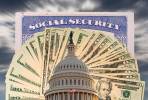Congress can’t allow Internet service to be taxed
Nevada schoolchildren are preparing to head back to the classroom. Meanwhile, members of Congress are counting the days until they must head back to Washington. When students start cracking open laptops, lawmakers will be taking a crack at critical legislation affecting taxpayers.
This is not to compare bickering senators and representatives with kids. Still, there is a connection between our leaders in the nation's capital and children across Nevada. Unless Congress acts very soon, the Internet access that families and schools depend on for so many daily tasks — like researching those book reports for school — could get a lot more expensive.
Originally enacted in 1998 by President Bill Clinton, the temporary Internet Tax Moratorium has been extended five times, with broad bipartisan support. The legislation bans taxes on Internet access for consumers. That means each month, your bill for Internet service remains free of the heavy state and local taxes that weigh down other forms of telecommunications, such as landline phones.
Besides taking a stand against predatory policies toward technology, lawmakers put the moratorium into law to remove impediments preventing consumer adoption of Internet services. The effect has been profound, but there are still areas of the country, including Nevada, whose adoption rates would benefit from minimal taxes on the Internet. This legislation helps all Americans, regardless of race, income or neighborhood discover opportunities.
Alarmingly, the current Internet Tax Moratorium expires Oct. 1. In response, the House of Representatives has passed the Permanent Internet Tax Freedom Act. Now it's the Senate's turn to adopt this bipartisan bill or a "clean" version of its own companion legislation — without entangling it among other unrelated tax issues, such as the Marketplace Fairness Act, which would allow governments to collect sales taxes on Internet purchases, even when retailers have no physical presence in a state.
Indeed, the Senate's own tax moratorium extension legislation has 51 sponsors and co-sponsors, including Sen. Dean Heller, R-Nev. Tying this very popular, bipartisan bill to the highly controversial MFA is not only unfair, it is unwise. More than 10,000 state and local jurisdictions across the nation tax telecom services and would be naturally disposed to target the online realm next. If the current Internet Tax Moratorium is allowed to expire in less than two months, citizens could face significant increases in their Internet bills.
As The Wall Street Journal's editorial board wrote, "taxes and fees on wireless telephone services average more than 17 [percent]. The rates on traditional wired telephone services are similar and would be virtually guaranteed to stunt technological progress even as they punish Internet consumers."
These are the types of levies that local politicians would naturally be inclined to slap on Internet access if given the chance. Even cable and video services get hit with an average of 12 percent, versus 7 percent for other goods and services. Those telecom taxes are onerous in their own right and should be scaled back rather than applied to online service.
Eliminating the threat of taxing broadband Internet should be an easy lift for lawmakers. All it will take is setting aside legislative wheeling and dealing, and recognizing that the bipartisan ban on access taxes should pass as a stand-alone bill, without extraneous matters such as the Marketplace Fairness Act.
As the minority leader, Sen. Harry Reid has an opportunity to drive home a legislative win for Democrats, Nevada and consumers. The Senate is about to have its teachable moment on Internet taxes; here's hoping lawmakers embrace it.
Pete Sepp is president of the National Taxpayers Union (ntu.org), a nonpartisan citizen group founded in 1969 to work for low taxes and limited government.























